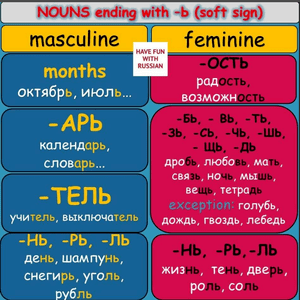Gender of Russian nouns ending in a soft sign -ь – How to determine it?

by Elena Voronina,
Online Russian Tutor
MA Hons in Language Teaching,
MA Hons in Psychology
Wondering how to determine the gender of Russian nouns? Actually, in most cases, you just have to look at their endings in nominative case singular.

Those ending in a consonant or a soft sign are masculine. Feminine nouns have -a, -я or -ь at the end. And neuter gender nouns are spelt with final -е, -o or -мя. It means that when a non-native student of Russian comes across a noun ending in a soft sign (-ь), the only information he gets about its gender is that the given word is not a neuter one. So, if the last letter of the word is a soft sign -ь, then the noun could be either masculine or feminine. But it is very important to know the gender as it determines how the cases of the noun are formed.

At least 400 nouns ending in a soft sign are widely used in the modern Russian language spoken nowadays. Among them approximately 78% are feminine and the remaining 22% are masculine. So how to know the gender of Russian nouns spelled with a final -ь? Here are the useful rules!
Masculine and feminine nouns ending in soft sign
| Russian masculine nouns ending in a soft sign | Russian feminine nouns ending in a soft sign |
| Nouns denoting male persons and animals Король [karOl’] – king Парень [pAreen’] – fellow, guy Зять [zyat’] – son-in-law Тесть [tyest’] – father-in-law Гость [gost’] – guest (fem. гостья) Конь [kon’] – male horse | Nouns denoting female persons and animals мать [mat’] – mother дочь [doch] – daughter свекровь [sveekrOf’] – mother-in-law лошадь [lOshat’] – horse |
| Names of all months Январь [yanvAr’] – January Июль [eeYOOl’] – July Октябрь [aktYAbr’] – October | Осень [Oseen’] – autumn |
| Names of most of the animals, birds, insects and fish Зверь [zvyer’] – animal Медведь [meedvYEt’] – bear Олень [alYEn’] – deer Лось [los’] – moose Голубь [gOloop’] – dove Гусь [goos’] – goose Лебедь [lYEbyet’] – swan Шмель [shmel’] – bumblebee Карась [karAs’] – crucian carp Лосось [losOs’] – salmon | Nouns ending in husher + ь (-жь, -чь, -шь, -щь) Молодёжь [maladYOsh] – young people Ложь [losh] – lie Печь [pyech] – stove Ночь [noch] – night Мелочь [mYElach] – small change Речь [ryech] – speech Брошь [brosh] – brooch Чушь [choosh] – nonsense Мышь [mysh] – mouse Вещь [vyesch] – thing Мощь [mosch] – power Помощь [pOmasch] – help |
| Nouns ending in the suffix–тель(denoting a doer of the action) Водитель [vadEEtyel’] – driver Учитель [oochEEtyel’] – teacher Покупатель [pakoopAtyel’] – shopper Писатель [peesAtyel’] – writer Читатель [cheetAtyel’] – reader Зритель [zrEEtyel’] – spectator Житель [zhEEtyel’] – inhabitant Выключатель [vyklyoochAtyel’] – switch | Nouns ending in –сть (except гость – a male person) Молодость [mOladast’] – youth Вежливость [vYEzhleevast’] – politeness Новость [nOvast’] – news Радость [rAdast’] – joy Смелость [smYElast’] – courage Скорость [skOrast’] – speed Свежесть [svYEzheest’] – freshness Тяжесть [tYAzheest’] – gravity Ненависть [nYEnaveest’] – hatred Грусть [groost’] – sadness Часть [chast’] – part Шерсть [shyerst’] – wool Власть [vlast’] – power Повесть [pOveest’] – short novel Совесть [sOveest’] – conscience |
| Nouns ending in the suffix –арь Секретарь [seekreetAr’] – secretary Фонарь [fanAr’] – lamp Аптекарь [aptEYkar’] – pharmacist Вратарь [vratAr’] – goalkeeper Календарь [kaleendAr’] – calendar Библиотекарь [beebleeatYEkar’] – librarian Пекарь [pYEkar’] – baker | Nouns ending in -бь, -вь, -дь, -зь, -сь, -ть (if not the names of animals or exceptions) Скорбь [skorp’] – sorrow Кровь [krof’] – blood Обувь [Oboof’] – footwear Любовь [lyoobOf’] – love Морковь [markOf’] – carrot Церковь [tsYErkaf’] – church Бровь [brof’] – eyebrow Грудь [groot’] – breast Очередь [Ocheereet’] – queue Площадь [plOschat’] – square Тетрадь [teetrAt’] – notebook Связь [svyas’] – connection Грязь [gryas’] – dirt Запись [zApees’] – note Кровать [kravAt’] – bed Память [pAmyat’] – memory Смерть [smyert’] – death
Exceptions (masculine gender nouns): |

As we can see from the table above nouns ending in -ль, -нь, -рь can be both of masculine and feminine gender. So what to do with such words? In fact, there are not too many of them and the only way to determine their gender is to memorize it. These nouns are listed in the table below. In case you need professional help from a native Russian tutor via video-conferencing, start learning with us today!
Russian Nouns Ending in Soft Sign That You Have to Memorize
| Masculine | Feminine |
| Картофель [kartOfeel’] – potato Портфель [partfYEl’] – briefcase Автомобиль [avtamabEEl’] – car Ноль [nol’] – zero Кашель [kAsheel’] – cough Контроль [kantrOl’] – control Корабль [karAbl’] – ship Рояль [raYAl’] – piano Рубль [roobl’] – ruble Руль [rool’] – steering wheel Спектакль [speektAkl’] – play Стиль [steel’] – style Уголь [OOgal’] – coal Фестиваль [feesteevAl’] – festival | Метель [meetYEl’] – snowstorm Постель [pastYEl’] – bedding (ending in -тель, but is not an action doer) Даль [dal’] – distance Боль [bol’] – pain Мебель [mYEbeel’] – furniture Медаль [meedAl’] – medal Мысль [mysl’] – thought Деталь [deetAl’] – detail Роль [rol’] – role Соль [sol’] – salt Цель [tsyel’] – aim Фасоль [fasOl’] – beаn |
| Огонь [agOn’] – fire День [dyen’] – day Полдень [pOldyen’] – midday Уровень [OOraveen’] – level Корень [kOreen’] – root Камень [kAmeen’] – stone Ремень [reemEEn’] – belt | Лень [leyn’] – laziness Ткань [tkan’] – fabric Болезнь [balYEzn’] – illness Жизнь [zheezn’] – life Тень [ten’] – shadow |
| Лагерь [lAgeer’] – camp | Дверь [dvyer’] – door |
How to remember the gender of Russian nouns ending in soft sign?
It is useful to associate such noun with a meaningful adjective or a possessive pronoun. For example, look at the following word combinations:
| Твой новый автомобиль – your new car | Моя счастливая жизнь – my happy life |
| Ваш осенний дождь – your autumn rain | Наша синяя ткань – our blue fabric |

In the above examples, the endings of the nouns don’t say anything about their gender but their adjectives and pronouns do! Adjectives ending in -ий / -ый or -ой describe only masculine nouns, whereas adjectives ending in -ая or -яя refer to feminine ones. As for the pronouns, those ending in -а/ -я are used with feminine nouns. Those spelled with -й at the end or having zero endings are of masculine gender. So, by pairing a noun ending in -ь with an adjective or a possessive pronoun, you will instantly recall its gender.

Indeed, gender of nouns in Russian can be easily determined by their ending. Of course, those spelled with a soft sign at the end are the tricky ones. Both masculine and feminine nouns can end in – ь. Hopefully, today I answered your question about how to know the gender of Russian nouns ending in soft sign.
However, if you need more information about Russian language from expert native-speaking tutors, book online lessons with us. The first trial lesson is free.
As a side note, our team of skilled native Russian linguists provides a wide range of language services: from English <> Russian translation services to deciphering Russian cursive. Moreover, we not only deal with typed or written texts but also manually transcribe and translate Russian audio recordings. Get your accurate transcript either in Russian or English!
Moreover, we are also profficient in Ukrainian having bilingual experts in our team. Given that all our staff members hold university degrees in English linguistics, we can easily translate English to Ukrainian and Ukrainian to English.
In a word, we would be happy to assist you with any Russian or Ukrainian linguistic project.


What i don’t understood is in reality how you’re now not actually a lot more neatly-appreciated than you may be now. You are very intelligent. You recognize thus considerably when it comes to this subject, produced me individually imagine it from numerous varied angles. Your own stuffs outstanding. Always deal with it up!
I like this post, enjoyed this one thanks for putting up. “To affect the quality of the day that is the art of life.” by Henry David Thoreau.
I believe this web site contains some rattling fantastic info for everyone. “He who has not looked on Sorrow will never see Joy.” by Kahlil Gibran.
Merely wanna input on few general things, The website layout is perfect, the content material is rattling fantastic : D.
great post, very informative. I wonder why the other specialists of this sector don’t notice this. You should continue your writing. I am sure, you have a great readers’ base already!
What’s Going down i am new to this, I stumbled upon this I’ve discovered It positively helpful and it has helped me out loads. I am hoping to contribute & help other customers like its aided me. Great job.